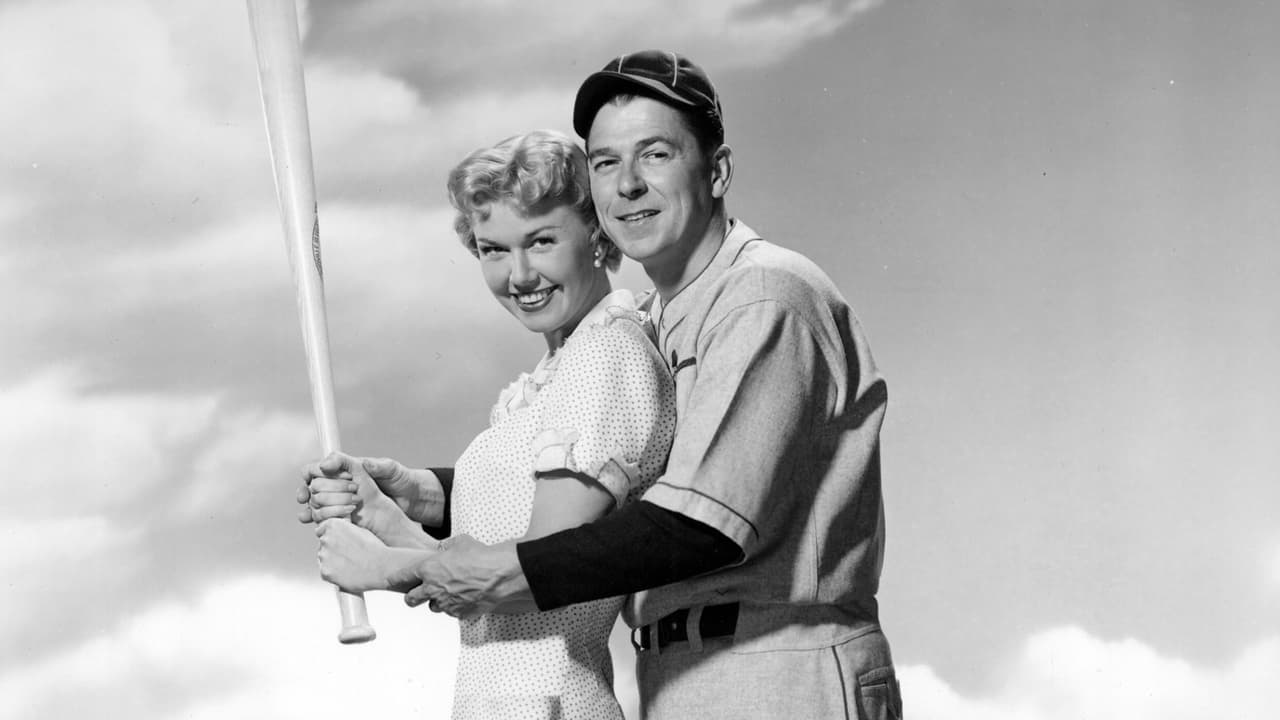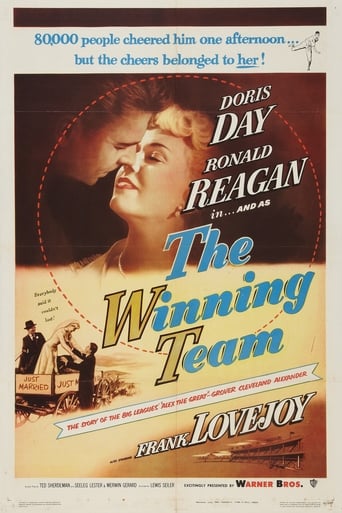

I remember renting this movie with my mom. She'd recently recovered from a vertigo attack, and I reassured her, "Don't worry, this movie won't make you sick. It's from 1952!" Low and behold, I happened to pick the one film from the silver screen that actually triggered my mom's vertigo; Ronald Reagan's character had a problem with his eyesight and the camera blurred and swirled. After I told her the famous, "Don't look, Mom!" we had a good laugh about it.With that big build-up, the movie had better be good, right? I'm sorry to disappoint you, but this baseball movie starring Ronald Reagan and Doris Day isn't very good. If you're a die-hard baseball fan and happen to love Ronald Reagan, go right ahead. I always get a kick out of seeing him in his young, handsome glory-he looked like my old sweetie pie from high school! Besides the eye candy, it's a pretty mediocre movie. It's a biography of Grover Cleveland Alexander, and shows his midwestern roots, his courtship and marriage to small-town sweetheart Doris Day, his medical problems, and his overwhelming obsession with baseball. He puts the sport above everything else in his life, including Doris, but she steps up to the plate as the "long suffering wife" and supports him through his neglect. The Winning Team doesn't really hold a candle to The Pride of the Yankees, so you're better off just sticking with that one.DLM Warning: If you suffer from vertigo or dizzy spells, like my mom does, this movie might not your friend. There are times when the camera swirls and blurs, and that will make you sick. In other words, "Don't Look, Mom!"
... View MoreWhen Forbes Field was mentioned, they spelled Pittsburgh incorrectly. They left out the last letter.That being said, we have a very solid movie here with a marvelous performance by future President Ronald Reagan as Grover Cleveland Alexander. Unfortunately, Doris Day would need another 3 years to develop as a dramatic actress and that would come in her brilliantly breakout performance in "Love Me or Leave Me."It's really a shame that there were some distortions in the film. I read that Amy Alexander divorced her husband twice and remarried him for a 3rd time. It's also ridiculous that the script never mentioned that Alexander suffered from epilepsy. After all, talking about his dizzy spells through us all of somewhat.The picture itself is a heartbreak. From humble beginnings, Alexander became a star baseball pitcher only to suffer a beaning and epilepsy, the latter being confused with alcoholism; although, it was shown that he was hitting the bottle as well as a way out of his frustration.The film succeeds because of his triumph and amazing comeback.Reagan totally captured the essence of Grover Cleveland Alexander. Miss Day did not. Jeanne Crain would have been better suited for the part.
... View MoreNebraska farmer Ronald Reagan (as Grover Cleveland Alexander) wants to be a baseball player so bad he drops the ball on dating pretty Doris Day (as Aimee Arrants), for the big games. This makes father Frank Ferguson (as Sam) reluctant to approve the wedding, but Reagan and Ms. Day are quickly married, anyway. The big event occurs after Mr. Reagan gets hit in the head by a ball; he recovers, but with what the doctor calls "double vision." This on-again, off-again setback eventually drives Reagan to drink, threatening both his career and marriage. Can "The Winning Team" (their marriage) survive? In "Her Own Story", Day confirmed she and "Ronnie" had a brief, real-life romantic relationship, while they were both between marriages. Interestingly, Day states the future President had a lovely apartment, was a great dancer, and spoke enough to give her the impression he was "a very aggressive liberal Democrat." Their best scenes are with (later in the picture) each other, and with (earlier in the picture) movie family members Mr. Ferguson and young Russ "Rusty" Tamblyn (later residents of "Peyton Place")."This Is the True Story of Grover Cleveland Alexander," is the film's opening proclamation. It looks more like the studio shoved the early 1900s baseball player's life story into the typical formula film. As usual, the early scenes reveal a lead actor clearly too old for the part, as Reagan is playing a man half his age; this was something more convincingly done by Gary Cooper and Jimmy Stewart. Unfortunately, you spend the whole film wondering what Reagan's "double vision" problem is, exactly - and, don't expect the film to give you the answer. Day sings a very pretty Christmas song ("Ol' Saint Nicholas").**** The Winning Team (6/20/52) Lewis Seiler ~ Ronald Reagan, Doris Day, Frank Lovejoy, Frank Ferguson
... View MoreI rated it higher than I normally would because it is a film that deserves to be watched.Anyone who had the benefit of seeing insider comments from the classic film network I taped it from would know that Grover Cleveland Alexander suffered from seizures do to epilepsy.Ronald Reagan was quite disappointed at the film company not including that in the film and not naming the disease, though implying some physical problem was involved in Alexander's problems.The drinking was due to fear (which the film touches on) from NOT UNDERSTANDING EPILEPSY and the seizures that he had.I think Reagan gave the character life and those who point out his deficiencies as an athlete don't mention that he was an athlete himself, playing football and eventually got a job as a sports announcer. That job helped him land his first role in Hollywood as a sports announcer on screen.No actor is going to play baseball as well as an actual baseball player. It is a skill that many have tried and few succeed at. 'Knowing' the sport is not the same as being able to play it to the level of a big leaguer.So, forgiving an actor for not being able to pitch like a real big leaguer is not hard when the main story here is his life, his marriage and his service to his country and to baseball between his very real struggles of epilepsy and drinking.The film is actually quite ground breaking, covering something from an era where these things were often covered up and if they did make the news, they were public scandals. In this case, Mrs. Alexander (who was played brilliantly by Doris Day here), protected her husband's image at the time by omitting (apparently) some divorces that were designed to help him come to his senses.Perhaps it was to help protect her as well. She probably felt she made mistakes too in trying to help him the wrong way. It's hard to know how to handle when someone's whole personality changes due to an illness.The way the media is today, an athlete's whole career could be railroaded with no second chance by an episode of making a bad choice due to pain of getting intoxicated. This doesn't excuse Alexander's bad choices. He should have been honest with his wife and got help (also should have been honest with his baseball team(s)).But the fact is, Babe Ruth would likely have had a tough time getting in the Hall of Fame in this age when Mark McGuire was overlooked because some people BELIEVE he used illegal steroids. It has yet to be proved and he never admitted it, only to the use of legal vitamin supplements, yet he isn't in the Hall of Fame.Pete Rose is not forgiven to this day for the gambling which didn't occur as a player, but apparently as a manager.Yes, baseball as in all of life should have standards. I just see that there have been many double standards as in not giving people a second chance and trying to build up heroes just to knock them down and ruin their lives.Enough of them do it on their own (i.e. Ken Caminiti, Jose Conseco, etc.) without having to have people who aren't even in the know judging men who have the same weaknesses as us, yet have sought to inspire us to rise above those weaknesses and excel at something to give young people encouragement.One unguarded moment or comment off the record to a reporter these days is enough to ruin a guy's life and career. Some guys are truly bad characters and deserve it.Others, like Grover Cleveland Alexander, seem to deserve some understanding and compassion.Would he have received it in today's journalistic environment?
... View More